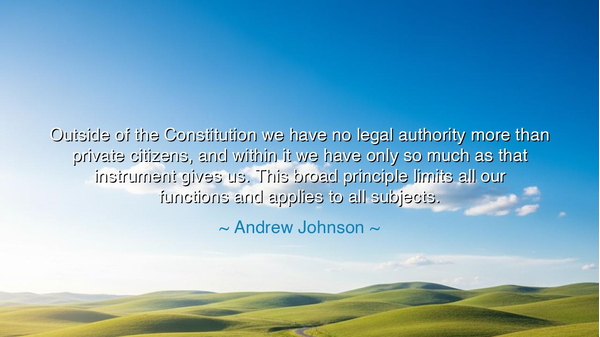
Outside of the Constitution we have no legal authority more than
Outside of the Constitution we have no legal authority more than private citizens, and within it we have only so much as that instrument gives us. This broad principle limits all our functions and applies to all subjects.






Hear the weighty words of Andrew Johnson: “Outside of the Constitution we have no legal authority more than private citizens, and within it we have only so much as that instrument gives us. This broad principle limits all our functions and applies to all subjects.” These words ring with both humility and restraint, reminding us that rulers are not gods, nor masters, but servants bound by the chains of law. Here speaks the eternal truth of constitutional government: that power does not belong to the individual who holds office, but to the framework of law that grants it.
The meaning of this quote lies in the recognition that authority is not infinite. Legal authority flows not from personal ambition, nor from the will of the crowd, but from the Constitution, the sacred charter that defines the scope of government. Outside of this foundation, even presidents and legislators are no greater than the farmer or the laborer. Within it, their might is not boundless but measured, carefully limited so that liberty is preserved. Johnson’s words remind us that the true ruler is not the man, but the instrument of law itself.
The origin of this principle stretches back to the ancient world. In Rome, the Republic declared that no man, however great, was above the law. The Senate, the Consuls, even the mighty generals were subject to the laws of the Republic. When Julius Caesar crossed the Rubicon, defying these limits, the Republic fell into tyranny. So too does Johnson’s warning echo: if leaders step beyond the boundaries of the Constitution, they cease to be servants of the people and become mere private men wielding illegitimate power.
History of America itself proves this lesson. During the presidency of Abraham Lincoln, the nation faced the fiery crucible of civil war. Lincoln stretched the powers of the Constitution to preserve the Union, suspending habeas corpus and issuing the Emancipation Proclamation. Yet he never claimed authority beyond the Constitution’s reach; rather, he acted believing the preservation of the Republic itself justified such measures. His example stands in contrast to rulers who would claim authority outside the law, for Lincoln sought always to return power to its lawful limits once the crisis passed.
Andrew Johnson himself lived through this perilous moment. As successor to Lincoln, he was often criticized for his stubbornness, yet in this declaration he gave voice to a principle that outshines his controversies: that government must never wander beyond the bounds of the Constitution, for in doing so it loses legitimacy. Better a government constrained than a government unchained, for the former preserves liberty while the latter consumes it.
The lesson for us is profound: freedom is not secured by the goodwill of leaders, but by the vigilance of the people in guarding the boundaries of law. If citizens grow careless, rulers will stretch their powers like vines creeping beyond their trellis, and soon the structure of liberty collapses beneath the weight of ambition. The Constitution is not merely parchment—it is the safeguard of rights, the anchor of justice, the wall against tyranny.
Practical action lies in study and vigilance. Know the laws that protect you, for ignorance is the ally of tyranny. Question leaders who claim authority beyond their lawful reach. Defend the principle that government exists by the people’s consent, not by the ruler’s decree. In your own life, honor boundaries, for self-restraint is the seed of civic restraint. As the ancients taught: he who would govern others must first govern himself.
Thus let Johnson’s words be carried as a warning across the ages: outside the Constitution, no legal authority exists; within it, power is but a measured gift. Remember this, and no ruler will rise above the people. Forget it, and liberty will wither beneath the shadow of unchecked power. Better then to guard the law fiercely, for within its limits lies the promise of enduring freedom.






AAdministratorAdministrator
Welcome, honored guests. Please leave a comment, we will respond soon